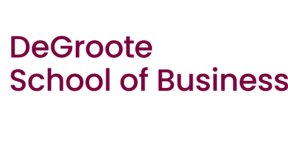
Curriculum overview

Core curriculum
The Master of Management in AI and Analytics is a 16-month, full-time graduate program at McMaster’s DeGroote School of Business. Designed to bridge the gap between data science and business strategy, the program combines advanced coursework with hands-on, experiential learning. Students benefit from a two-term Industry-Partnered Project and one-term work term, offering deep engagement with industry partners and real-world applications of AI and analytics in business settings. With the possibility of specialization and a curriculum infused with AI, the program equips graduates with the skills to lead in data-driven organizations.
Curriculum Highlights:
- 13-course structure delivered over three academic terms, balancing foundational knowledge with advanced applications
- Hands-on learning with tools such as Python, R, SQL, Tableau and cloud-based platforms
- Access to both an eight-month Industry-Partnered Project and a mandatory four-month industry work term, where you’ll apply AI and analytics solutions to real business problems
- Focus on applied AI and analytics including model development, data storytelling and ethical decision-making
- Specialization and capstone work in your final term to explore emerging technologies and personalize your learning path
Graduates of the program will be able to logically approach and build conceptual analytics models to support organizational, customer, and business decision-making and effectively communicate their insights with strong critical thinking and presentation skills. They will skillfully apply AI and analytics tools across diverse functional areas and industries, while thoughtfully evaluating the ethical, social and cultural implications of these technologies in business contexts. Additionally, they will demonstrate a solid understanding of applied AI and analytics tools and programming languages, enabling them to assess emerging developments in the field and apply AI strategically within business environments.
Schedule breakdown
This program features a 13-course curriculum including an 8-month Industry-Partnered Project that is spread across three academic terms, and is complemented with a four-month industry work term—blending academic depth with practical, hands-on learning.
Courses
This course will focus on three main areas: First, students will learn the process of acquiring data (cleaned and raw) from different sources and in different formats (AWS; Google; Envision). Second, students will be trained in data management (i.e., organization, storage, manipulation and distribution of data) using structured query language (SQL) and business intelligence (BI) tools, MS analytics tools (Power BI and Excel). Third, students will be taught visualization techniques for effective communication and storytelling using packages such as Tableau and Mathematica.
This course will focus on applying analytics techniques to managerial problems in different industries to prepare data-driven predictions and forecasts. Students will learn how to identify important drivers for prediction, applicability, and limitations of different predictive analytics techniques and evaluation of predicted data from various predictive models. Models based on real and simulated cases will be implemented in Python, and some data would come from platforms such as AWS, Google Cloud and Envision.
This course will provide an overview of the artificial intelligence (AI) landscape, and then take an in-depth look at two types of machine learning (ML) concepts: supervised learning including classification and prediction models; and unsupervised learning including clustering and association rule analysis. Both real and simulated case studies will be studied using different ML models implemented in Python, R and Mathematica, and the results will be analyzed to develop insights and provide recommendations.
This course will introduce students to the fundamental concept of business statistics, and then cover the multivariate statistical techniques and their applications in real-world business problems. This course will cover descriptive and inferential statistics, probability distributions, hypotheses testing, regression analysis and then focus on the processing, analysis and treatment of multivariate data. Both real and simulated case studies will be analyzed using a combination of Python, R and Excel to develop insights and provide recommendations.
Terms 1 and 2
This course is designed to equip students with the resources and personalized strategies necessary to successfully secure a work term (internship) and to achieve their long-term career goals. The course will focus on a continuous learning approach to career development, with specific emphasis on
- Evaluating and planning for work term and new grad opportunities including career exploration and decision-making.
- Creating a personalized portfolio and developing strategies for professional development and skills acquisition.
- Maximizing success and learning during their work term through professional development.
Students will be exposed to ethical dilemmas and legal considerations related to job searches, as well as best practices for stress management during job searching. Students will gain clarity regarding the alignment between values, interests and motivators in relation to their career, and be empowered to play an active role in shaping their career path. The overall goal of this course it to help students gain self-awareness, skills, knowledge and confidence in relation to employment and their career goals.
During Terms I and II, students will participate in a two-phase Industry-Partnered Project, working in small teams of three to four. The Project follows McMaster University’s inquiry-based learning model, where students identify real-world problems, apply relevant tools and knowledge and present viable solutions.
Phase I: Discovery & Foundation
In Phase I, students are grouped based on their interests in applying analytics within a specific industry or sector. With support from a faculty instructor, each team connects with an industry partner to identify a real-world managerial challenge and establish parameters for data collection. Meetings with partners may take place in person or virtually, depending on availability and accessibility.
To prepare for the applied work ahead, students also complete a research methods module, covering:
- Effective use of academic and industry search engines
- Identifying, evaluating, citing and incorporating sources
- Organizing and synthesizing research findings
Additionally, Phase I includes opportunities to refresh key technical skills in tools, programming and techniques essential for analytics and applied AI.
Phase II: Application & Analysis
In Phase II, students deepen their research by identifying relevant datasets and selecting appropriate analytics tools and methodologies. Using these, teams analyze the data and generate evidence-based solutions.
The final deliverable includes a presentation of findings to instructors and industry partners, followed by collaborative feedback sessions.
Real-World Impact, Career-Ready Skills
The Industry-Partnered Project is designed to help students bridge theory and practice, while developing critical skills for careers in analytics-driven fields. Students will strengthen:
- Mathematical and computer modeling capabilities
- Tool and algorithm selection for problem-solving
- Data analysis and interpretation
- Communication and collaboration with industry professionals
By the end of the Project, students will be equipped to tackle complex problems with confidence, insight and a well-rounded professional toolkit.
This course will introduce students to the basic concepts of modeling and computer simulation of complex systems, as well as addressing different aspects of analytics. It will cover modeling and risk analysis with a focus on continuous and discrete event simulation. Relevant concepts will be introduced through real and simulated case studies depicting managerial problems from different functional areas of business. A wide range of industries will be modeled and analyzed in MS Excel and Arena.
This course will train students to formulate managerial problems as mathematical models, to acquire data for these models, to implement and solve these models in a computer environment and to interpret the resulting solutions to gain managerial insights. Model implementation based on real/simulated case studies and problem settings will take place in Python (a leading general-purpose programming languages) and in Analytic Solver, integrates seamlessly in MS Excel.
This course will focus on more sophisticated algorithms of AI. More specifically, it will discuss the basics of reinforcement learning, deep learning and large language models and their applications to business problems. This course will make use of large datasets and case studies, which will be analyzed using the built-in libraries in Python and Mathematica, to demonstrate the workings of the above algorithms (techniques) and to explain how they facilitate efficient and effective decision making.
This course will focus on the role of AI and Analytics in driving organizational success by focusing on what to do, how to make it happen and how to lead. Areas of focus will include: the significance of data (AI and Analytics) in strategy development; defining and creating a culture of analytics; and leading and managing both organizational and individual change. The course will also highlight the importance of communication, teamwork and trust in both leading and implementing analytics projects.
Terms 1 and 2
This course is designed to equip students with the resources and personalized strategies necessary to successfully secure a work term (internship) and to achieve their long-term career goals. The course will focus on a continuous learning approach to career development, with specific emphasis on
- Evaluating and planning for work term and new grad opportunities including career exploration and decision-making.
- Creating a personalized portfolio and developing strategies for professional development and skills acquisition.
- Maximizing success and learning during their work term through professional development.
Students will be exposed to ethical dilemmas and legal considerations related to job searches, as well as best practices for stress management during job searching. Students will gain clarity regarding the alignment between values, interests and motivators in relation to their career, and be empowered to play an active role in shaping their career path. The overall goal of this course it to help students gain self-awareness, skills, knowledge and confidence in relation to employment and their career goals.
During Terms I and II, students will participate in a two-phase Industry-Partnered Project, working in small teams of three to four. The Project follows McMaster University’s inquiry-based learning model, where students identify real-world problems, apply relevant tools and knowledge and present viable solutions.
Phase I: Discovery & Foundation
In Phase I, students are grouped based on their interests in applying analytics within a specific industry or sector. With support from a faculty instructor, each team connects with an industry partner to identify a real-world managerial challenge and establish parameters for data collection. Meetings with partners may take place in person or virtually, depending on availability and accessibility.
To prepare for the applied work ahead, students also complete a research methods module, covering:
- Effective use of academic and industry search engines
- Identifying, evaluating, citing and incorporating sources
- Organizing and synthesizing research findings
Additionally, Phase I includes opportunities to refresh key technical skills in tools, programming and techniques essential for analytics and applied AI.
Phase II: Application & Analysis
In Phase II, students deepen their research by identifying relevant datasets and selecting appropriate analytics tools and methodologies. Using these, teams analyze the data and generate evidence-based solutions.
The final deliverable includes a presentation of findings to instructors and industry partners, followed by collaborative feedback sessions.
Real-World Impact, Career-Ready Skills
The Industry-Partnered Project is designed to help students bridge theory and practice, while developing critical skills for careers in analytics-driven fields. Students will strengthen:
- Mathematical and computer modeling capabilities
- Tool and algorithm selection for problem-solving
- Data analysis and interpretation
- Communication and collaboration with industry professionals
By the end of the Project, students will be equipped to tackle complex problems with confidence, insight and a well-rounded professional toolkit.
Full-time paid employment in an approved work term providing students with work experience related to their academic curriculum.
This course will explore the implications of AI on business and society. It will explore the set of guiding principles that stakeholders (academics, government, intergovernmental entities, non-profit organizations and private companies) use to ensure AI technology is developed and used responsibly. The course will examine case studies and relevant developments of the role played by a strong code of ethics and government-led frameworks in helping regulate AI technology.
In this course, students will learn about revenue management and pricing analytics, whereby managerial decisions aim to sell the right products to the right customers at the right price at the right time. Students will learn to build data-driven models to gauge customer preferences, plan capacity and make pricing decisions. This course will rely on lectures, case studies and exercises to demonstrate the concepts; computer modeling of problems will be in MS Excel and Python.
This course will cover the management of activities and processes used to produce goods and services for customers within an organization and across a network of entities forming a supply chain. The course will make use of lectures, interactive sessions, real and simulated case studies, data visualization and analyses and group presentations to understand how massive amounts of data can be used to make evidence-based decisions within an organization and across supply chains. The course will use packages such as SAP Hana, Mathematica, and Tableau.
The first part of the course will introduce the concept of procurement and demonstrate how to use procurement data for effective decision making. The second part of the course will outline the field of logistics and then explore how to use data to prepare more efficient location, distribution, and transportation planning; optimize inventory at one or more locations; prepare better prediction of demand; gauge customer experience; and slot items on a shelf. This course will use software packages such as SAP Hana, Python, Mathematica and Excel.
In this course, students will explore Synthetic Consumer Analytics (SCA), which uses synthetic data (e.g., numeric, text, image) to mimic real consumers. Once the synthetic consumers are generated, the course will also draw on causal inference applications to establish cause-effect mechanisms across marketing settings. This course will rely on lectures, case studies, problem sets and exercises to demonstrate the concepts. Relevant modeling and analyses will be done in Python or R programming languages.
In this course, students will learn the use of data, statistical analysis and technology to gain insights that drive better decision-making in human resources management. This course will discuss how HR-related data should be collected, analyzed, interpreted to measure the impact of HR programs (talent acquisition, employee engagement and retention, performance management, workforce planning, compliance) and then related to policies and practices to improve overall business performance.

Applied experiences across every course
Our programs embed real-world experience into the academic structure. Students gain exposure to how AI and analytics drive decisions in different industries.


Have any questions?
Our DeGroote team is here to support you every step of the way. If you have any questions or need help with your application, don’t hesitate to reach out.

